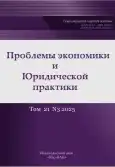From ESG to EPG: Evolution of Concepts in the Context of Economic Security
- Authors: Zagornova V.Y.1, Panarin A.A.1
-
Affiliations:
- International Banking Institute named after Anatoliy Sobchak
- Issue: Vol 21, No 3 (2025)
- Pages: 203-209
- Section: Regional and Sectoral Economics
- URL: https://journals.eco-vector.com/2541-8025/article/view/688197
- DOI: https://doi.org/10.33693/2541-8025-2025-21-3-203-209
- EDN: https://elibrary.ru/PLVACJ
- ID: 688197
Cite item
Abstract
The purpose of writing the research work is to substantiate the feasibility and possibility of developing the content and scope of application of the ECG rating (E-ecology, K-personnel, G-state) and the formation of the ECG concept that ensures the achievement of sustainable development goals taking into account national interests and in accordance with the tasks of ensuring national security. Conclusions. The ESG agenda as a global trend of achieving sustainable development has given rise to a number of threats that have intensified in the new geopolitical conditions. Focus on national interests naturally required a transition from the ESG to the EPG (Ecology, Personnel, Governance) concept, which is a set of connections in the "ecology-personnel-state" system between economic entities, executive authorities of the constituent entity of the Russian Federation and local governments and indirectly with federal authorities. Analysis of the National Standard of the Russian Federation GOST R 71198-2023 "Index of business reputation of business entities (EPG rating). The methodology of assessment and the procedure for forming the EPG of responsible business" led to the conclusion that the rating only indirectly reflects the relationship of business with regional and local government bodies, and does not take into account the effectiveness of their actions to ensure an environment of sustainable development and responsible business. In expanding the content of the model law "On the development of responsible business in the Russian Federation", principles are proposed that consolidate the hierarchy of priorities at the national level over regional ones in achieving sustainable development goals, which corresponds to strategic documents in the field of economic security. The characteristics of threats to the economic security of the region are presented within the framework of the EPG concept.
Full Text
About the authors
Victoria Yu. Zagornova
International Banking Institute named after Anatoliy Sobchak
Author for correspondence.
Email: orgcom@ibispb.ru
SPIN-code: 1630-6227
Scopus Author ID: 1270213
postgraduate
Russian Federation, Saint-PetersburgAndrey A. Panarin
International Banking Institute named after Anatoliy Sobchak
Email: panarin@ibispb.ru
Scopus Author ID: 733107
Dr. Sci. (Econ.), Associate Professor, Professor of the Department of Economics, Management and Entrepreneurship
Russian Federation, Saint-PetersburgReferences
- Advokatova A.S., Zavorykin A.A. ESG agenda and aggressive tax planning//Economics. Taxes. Law. 2023. Vol. 16. No. 3. Pp. 144–152. EDN: NZKHEM.
- Bagirowa A.P., Neshataev A.V. Russian employer as a potential subject of influence on the demographic situation in the region // AlterEconomics. 2024. No. 2. Pp. 268–285. EDN: MLLYHH.
- Bezdeneshnykh T.I., Sigova M.V., Sharafanova E.E. ESG agenda as a factor in regional economic security // In the collection: The coming future: new formats, meanings and essences of education. Collection of materials of the XXI International scientific and practical conference. Anatoly Sobchak International Banking Institute. 2023. P. 34–40. EDN: SCKGXX.
- Vukovich N.A., Biryukova O.V., Krivokhizhin O.Yu., Olshanskaya I.B. Leaders of Responsible Business in Modern Russia // Vestn. Tomsk. state University. Philosophy. Sociology. Political Science. 2025. No. 83. P. 193–206. EDN: ZXYGVA.
- Zaborovskaya O.V., Sharafanova E.E., Plotnikova E.V. Features of the Conditions for the Formation and Development of Human Capital in the Russian Federation: Factor Analysis//Society. Environment. Development. 2015. No. 3 (36). P. 32–39. EDN: VDAMWV.
- Zakharov A. N., Mitkina M. A. Ensuring sustainable development in the EAEU space in modern realities // Russian Foreign Economic Bulletin. 2024. No. 10. P. 43–54. doi: 10.24412/2072-8042-2024-10-43-54.
- Zotova A. V. Comparison of ESG strategy and ECG rating // Professor's journal. Series: economic sciences. 2024. No. 4 (4). P. 36–39. EDN: GFSUET.
- Kabir L. S., Yakovlev I. A., Rakov I. D. Financing low-carbon development of Russia: approaches and priorities of the current stage // Economy. Taxes. Law. 2023. Vol. 16. No. 6. Pp. 6–17. EDN: WIJVAE.
- Kabir L.S., Sigova M.V., Rakov I.D. Rating of sustainable development of Russian regions: methodology of compilation and assessment results // Scientific Notes of the International Banking Institute. 2022. No. 3 (41). Pp. 83–104. EDN: QFHMUQ.
- Loginov D.A. System of threats to the economic security of the region // Innovative development of the economy. 2020. No. 6 (60). Pp. 301–309. EDN: UZVKGD.
- Protasova T.N. –Balance of family and work: on the issue of the involvement of Russian organizations in the implementation of the objectives of the state family policy // Theory and practice of social development. 2025. No. 3. P. 60–65. Doi.org/10.24158/tipor.2025.3.7.
- Smirnova E. Yu., Avdonina A. M. A specialist’s view through the prism of ESG and ECG competencies // Management accounting. 2024. No. 12. P. 61–67. EDN: HRZTQU
- Shulakov A. A. Legal mechanisms for protecting public interests of the Russian Federation from cross-border effects of ESG standards // Actual problems of Russian law. 2024. Vol. 19. No. 10. P. 167–180. doi: 10.17803/1994-1471.2024.167.10.167-180.
Supplementary files










